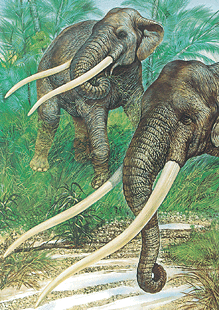Ancient Rib Bone Suggests Earlier Arrival for Humans to Americas
October 26, 2011
A spear point embedded in a fossilized mastodon rib discovered near Seattle is the latest archaeological finding to challenge a long-held theory that humans did not arrive in the Americas until about 13,000 years ago. Mastodons were elephant-like animals that lived across North America until they became extinct about 10,000 years ago.

Mastodons, like the two shown in this illustration, had huge tusks and wrinkled gray skin. World Book illustration by Bernard Robinson
Precise radiocarbon tests revealed that the rib dates to about 13,800 years ago. This date is several hundred years earlier than the first appearance of the Clovis culture in North America. (The Clovis culture is named for a site near Clovis, New Mexico, where remains of the culture were first recognized. The culture is identified by distinctive stone spearheads that are often found with the remains of extinct prehistoric animals.) For decades, scientists believed that the Clovis culture people were the first humans to arrive in the Western Hemisphere. The study of the mastodon rib, published in the Oct. 21, 2011, issue of the journal Science, strongly suggests that this long-held “Clovis-first” theory is wrong.
The fossil rib was discovered with other parts of the mastodon skeleton by a farmer in the late 1970′s at Sequim, Washington. Archaeologists found some signs that the mastodon had been butchered. But they did not find any stone tools that could have been used by human hunters to butcher their kill. The bones were kept in storage for nearly 30 years. Recently, scientists at the Center for the Study of the First Americans at Texas A&M University took another look at the bones.
Computed tomography (CT) scans of the rib revealed an embedded spear point, showing that the animal had been killed by human hunters. The scans also showed that the broken tip of the spear point, which was made of bone, had been carefully sharpened to a needle-like point. The scientists believe the original point was about 10 inches (25 centimeters) in length. The age and location of this prehistoric kill site suggests that human beings migrated to the Americas long before the development of the Clovis culture. Most archaeologists believe that the first humans arrived in North America after crossing a shelf of land across the Bering Sea during low sea levels toward the end of the last Ice Age. These prehistoric people followed and hunted mastodons and such other large animals as camels, horses, giant bison, and mammoths that lived in the region.
Additional World Book articles:
- Indians, American
- The First Americans (a special report)


